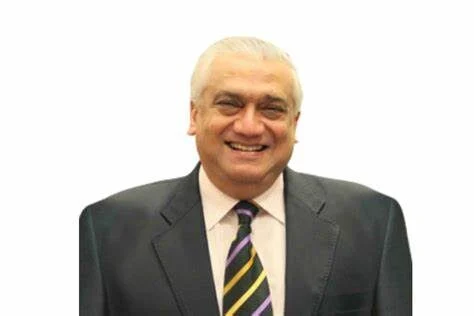TALMIZ AHMAD, a distinguished Indian diplomat renowned for his expertise in Middle Eastern affairs, has served as Indian Ambassador to Saudi Arabia, Oman, and the UAE. In an interview with MOHD NAUSHAD KHAN, he said conflict management, conflict resolution and a long-term comprehensive security arrangement for the region as a whole is the way forward.
How would you like to respond to the fall of Bashar al-Assad’s regime and the change of guard in Syria?
We were ill-prepared for the movements that were taking place behind the scenes. We have some information now, but all the information is still not available. And much of our understanding of what has occurred and the forces in play is based on personal speculation. But yes, I would say straight away that the fall of the regime is unexpected and dramatic.
The situation is still very fluid. An organisation referred to as Hayat Tahrir al-Sham (HTS), set up in January 2017, has asserted a certain political role in their new order and was part of the Syrian Salvation Government which had been in opposition.They have provided a Prime Minister and the HTS spokesperson remarks are conciliatory, very positive in character and basically talking about bringing the country together, accommodating the interests of minorities and women and ensuring that the country is run transparently.
We still have a long way to go. This is a highly unusual coalition, comprising diverse groups: the Syrian Democratic Forces, backed by the Americans and made up of Kurdish elements; the Syrian National Army (SNA), a Turkish-supported group with Turkmen elements; Turkish soldiers; and Hayat Tahrir al-Sham.
Currently, one group has reached Damascus, and intense fighting is underway. The SNA is actively attacking Kurdish forces. Simultaneously, Israel has conducted relentless airstrikes on various targets in Syria and has occupied some border areas. Given these developments, I am deeply pessimistic about the prospects for Syria’s future stability.
How is the regime change in Syria likely to impact the Muslim world, particularly the Middle East?
It is also again very difficult to say. The West Asia has been in the throat of instability and disorder for some time and many of the underlying issues have led to serious conflictual scenario. But over the last 14 months we have been witnessing the war in Gaza, the expansion of the war to the West Bank and Lebanon. The direct, tit-for-tat attacks between Israel and Iran. And now, of course, the recent development in Syria. So, the entire region now seems to be convulsed into a conflictual situation and it’s very difficult to know which way things will progress.
We also are reading about Israel wanting to carry out a major assault upon Iran to destroy its nuclear facilities and to perhaps carry out this attack in association with the Americans. But we do not know this will actually go forward during the Biden period.Or will they wait for Donald Trump? And if so, what will be the attitude of Trump? Fundamentally, if you look at a long-term perspective, the region has certain serious sources of instability and disorder that have not ever been addressed.
Basically, all the regimes in the region, from Morocco up to Yemen, are authoritarian. Number one, the state order across the region is very fragile and therefore the authoritarian regimes tend to use security forces to oppress their people and to disallow any expression of free will – that is a major source of instability.
Number two, the serious concerns we have are with regard to the economic situation. The countries are oil rich, but large sections of people there are unemployed. And in other countries which are not oil rich you have dire poverty and then of course you have actual on-going conflict. We have a civil conflict going on in Yemen where more than 100,000 people have been killed. We have had an ongoing conflict in Syria for a very long time in which about 500,000 people have been killed. And then of course you have the conflict in Gaza and Lebanon.
So not only do we have serious sources of fragility and disorder, we have had actual conflict within the region. And the core of this entire source of insecurity and instability is the unresolved Israel-Palestine issue that has of course very frequently made itself felt and has led major Israeli attacks on Palestinian communities. The most recent, of course, being the attack on the people in Gaza and in the West Bank.
How will the developments in Syria impact the axis of resistance against Israel?
The axis of resistance for the time being has been currently emasculated and frankly does not exist anymore. The attack on Hezbollah, Hamas, the decimation of top leadership of the two cadres. And now the regime changes in Syria and the emergence of a new government that is very hostile to Iran. I think it has effectively ended Iran’s policy of creating support basis in different countries across West Asia. It has now received a very serious setback and it does not have any more support bases that would come to assistance. Yes, there are cadres in Iraq and also in Yemen but I don’t think they would have any capacity to pursue Iran’s interest effectively in the face of a major assault. Iran also now has to face challenges possibly from Israel and even from Israel working with the American if they decide to launch a very major attack on Iran.
What do you think should be the role of India in Syria?
India has very crucial interests in the stability of West Asia, particularly in relation to its energy security, its trade, investments and joint ventures and the presence of the strong 8 million strong community. India has tended to have relations on bilateral bases and has never involved itself with the security challenges as the region has thrown up from time to time.
I believe even now India should take a fresh look at its traditional posture and see how it can use its influence in the region to promote at least some degree of conflict management. Specifically, I would say India should put together a coalition of another like-minded countries including Japan, Korea, China, Indonesia, Malaysia and also countries within the region such as Saudi Arabia, Qatar and UAE to counsel Netanyahu immediately not to escalate matters and carry out major attacks on Iran. Any attack upon Iran will have very serious consequences for the region as a whole. Iran dominates one half of the gulf. It also controls one half of the state of Hormuz, and has borders with Pakistan and Afghanistan as well as the Central Asia. I would believe that if this conflict spreads, Indian interests and those of many other countries will be adversely affected.
I would strongly recommend that India immediately utilise its influence, diplomatic resources, and counsel to engage its partners in Israel, particularly Prime Minister Netanyahu, to focus on the prospects of conflict management. Conflict management itself is an incredibly challenging task, as it requires addressing multiple dimensions simultaneously. First, we need to de-escalate the conflictual scenarios in the West Bank, Gaza, Lebanon, and Syria. Following this, initiatives must be taken to provide humanitarian assistance to the affected populations, including medical aid, food supplies, and rehousing displaced individuals.
Once immediate humanitarian concerns are addressed, we will need to confront longer-term challenges regarding governance in Gaza and the West Bank. This involves reviving the Palestinian Authority and organising elections to establish legitimate leadership for the region.
After achieving initial success in conflict management, the focus must shift to consultations, diplomatic initiatives, and confidence-building measures to address issues of mutual trust among the involved parties. These efforts will pave the way for a long-term solution: a comprehensive security arrangement that unites all countries in the region on a shared platform.
I agree that this is a long-term challenge, but these are the three stages that I’m looking at. Conflict management, conflict resolution and a long-term comprehensive security arrangement for the region as a whole.
What would you like to say about the future of Syria?
The regime change in Syria is the result of a conspiracy orchestrated by Türkiye, Israel, and the US, each pursuing its own agenda for removing Bashar al-Assad from power. For Türkiye, the primary objective was to exert pressure on the Kurds and safeguard its interests in northeastern Syria. Assad’s lack of support for these goals made his removal a priority for Ankara.
Israel’s agenda was centred on curbing Iran’s influence and Hezbollah’s presence in Syria. By removing Assad, Israel aimed to disrupt Iran’s access to the Mediterranean and prevent Syria from being used as a conduit for supplying Hezbollah in Lebanon. Additionally, there was a domestic political dimension to Israel’s involvement: bolstering Netanyahu’s stature. Facing domestic criticism, especially following the events of October 7 last year, Netanyahu sought to restore his image. Key developments contributing to this effort included the targeted killing of Hezbollah leadership, the assassination of Hamas leaders, and now, the regime change in Syria. Netanyahu has demonstrated to the Israeli people that he remains their strongest guardian. However, I personally believe these are short-term tactical advantages, and some of the domestic issues he faces will continue to trouble him in the months and years ahead.
The third player in this context is the United States, whose primary focus has been on pushing Iran out of Syria, weakening Hezbollah, and embarrassing Russia. This strategy aims to highlight Russia’s inability to defend its air and naval bases effectively and to undermine its credibility as a regional security partner. However, this approach appears to be part of a short-term game plan. None of the parties involved seem to have shown genuine concern for long-term peace and stability in the region.
My greatest fear is that Syria may go the way of Afghanistan, Iraq and Libya, where the American forces affected regime change but left the country in total shambles in which several hundred thousand people were killed. So, I am very worried about the future and I believe that it has been a great disservice to Syria as well as to the region that these three countries so cynically have initiated this major attack on the Syrian regime.


